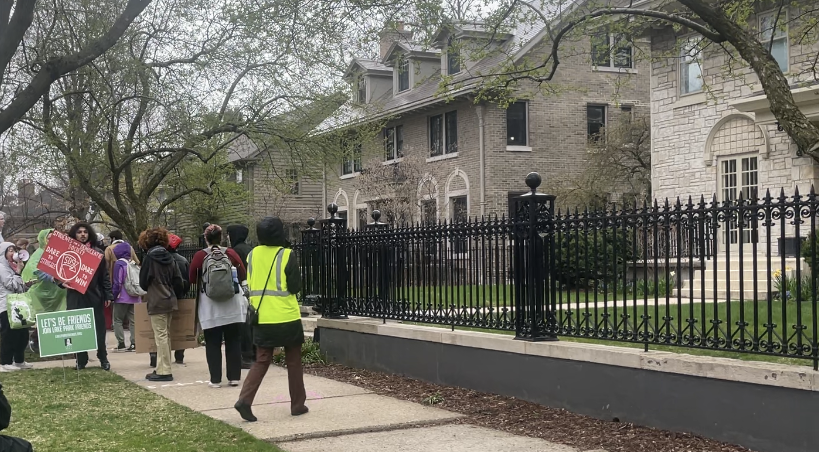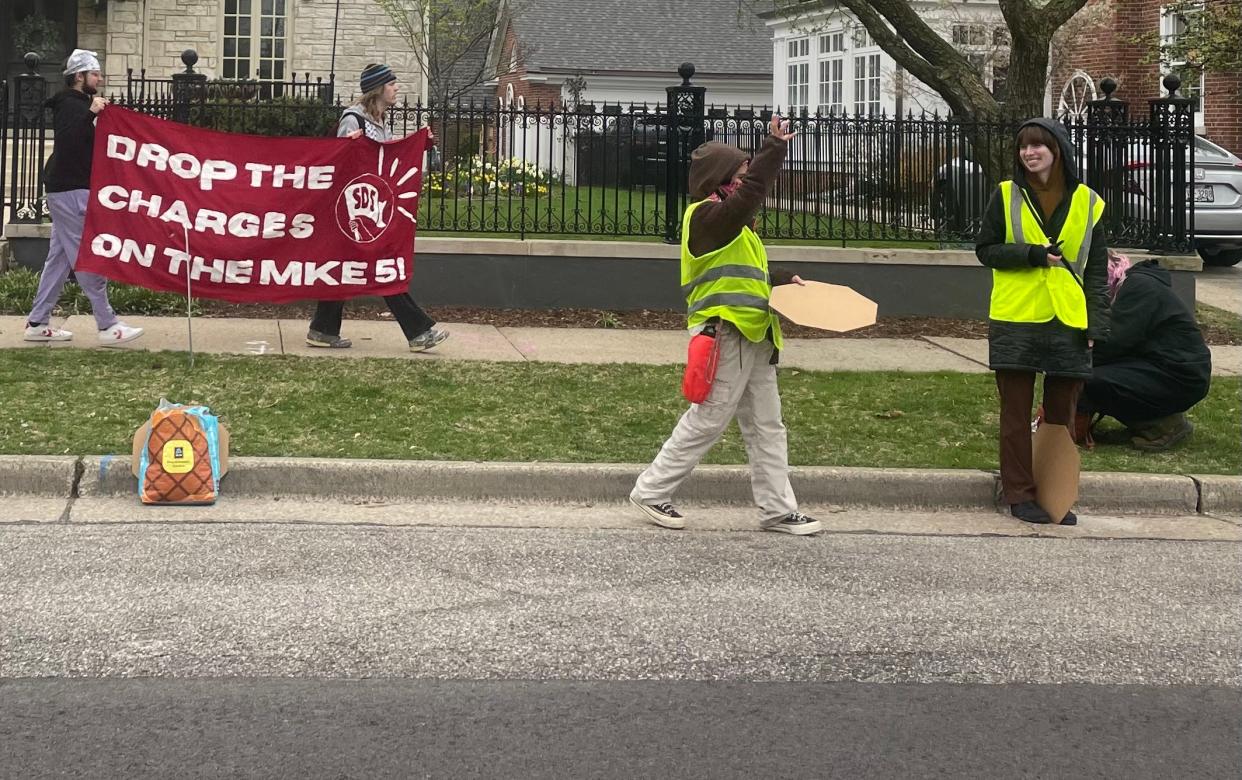Pro-Palestinian students picket outside UWM chancellor's residence, protest citations

Amid quickly intensifying rain and ongoing citations for a previous protest, two dozen protesters, mostly University of Wisconsin-Milwaukee students, picketed outside the UWM chancellor's residence in Shorewood on Thursday, April 18.
The protesters called on the school to help drop civil forfeiture charges against five students arrested during a February sit-in. They also resurrected their demand for UWM to rename the Golda Meir Library and end study-abroad trips to Israel, both of which have been focal points of previous protests organized by many of these students in response to Israel's retaliation against Palestinians in Gaza as part of its war with Hamas.
In response, UWM spokesperson Angelica Duria said the university has no study-abroad activity in Israel and no jurisdiction over Hillel, which provides birthright trips there, because the international organization, with hundreds of local groups for Jewish college students, is not a part of the university. Duria also said the authority to change building names rests with the UW Board of Regents.
The protest was organized by UWM's chapter of Students for a Democratic Society and sponsored by the Wisconsin Coalition for Justice in Palestine, SDS co-chair and student Audari Tamayo said.
Attendees hailed from a few additional groups, including the Milwaukee Anti-War Committee and the Milwaukee Alliance Against Racist and Political Repression.
Tamayo is one of five students facing fines related to a pro-Palestinian demonstration on Feb. 9 where students sat inside Chapman Hall on the UWM campus for six hours, waiting to schedule a meeting with Chancellor Mark Mone, according to circuit court case summaries.
Mone had been off-campus on Feb. 9, attending the Board of Regents meeting in Madison, said Angelica Duria, a university spokesperson.
In February, members of SDS told the Journal Sentinel they had been unsuccessful in trying to meet with Chancellor Mone for several months. On April 18, Tamayo said they eventually did get a meeting with Mone and are awaiting a second one.
In an email to the Journal Sentinel, Duria said, "UWM encourages open, respectful dialogue about complex and intensely emotional issues, and we are deeply committed to being an open and welcoming institution that respects everyone’s right to free speech. UWM is a public university, and it is our responsibility to allow free speech on campus, including issues surrounding the ongoing Middle East conflict."
On Thursday, many of the protesters marched along the sidewalk in front of Mone's residence, carrying large, red banners that said, "Drop the charges on the MKE 5."
One squad car could be seen at the end of the street.

UWM students face charges for February protest
Tamayo and the other four students are facing citations of assembly blocking, obstructing, unauthorized occupation, prohibited signs and prohibited noise — all carry fines of around $204 per person and no jail time, according to the circuit court summary.
On the day of the protest, Feb. 9, Chapman Hall was closed to the public with signs posted on the doors, Duria said. Around two dozen students made their way into the building and were informed they were acting unlawfully by refusing to leave, Duria said.
Four hours later, after 5 p.m., UWM police notified the students three times that they needed to leave or would face arrest and removal, Duria said.
Most of the assembled group did leave the building after hearing the final warning. However, five protesters were arrested. Police cited one protester for obstructing an officer, and four others for refusing to leave after the building’s posted closing time, she said.
On April 3, the students appeared in court and pleaded not guilty despite the offer of a plea deal, which would have lowered the fines, according to reporting from WISN. The students' lawyer, Milwaukee attorney Munjed Ahmad, told WISN he's working pro bono because he believes in their cause.
The root of the protest: the plight of those in Gaza
Tamayo said the group's protests primarily seek to highlight the dire situation faced by those in Gaza.
Since Hamas militants stormed into Israeli border communities, killing 1,200 people and taking 250 hostages, Israel’s retaliatory air and ground offensive has killed more than 30,000 Palestinians in Gaza and displaced more than 80% of the population of 2.3 million. (The number killed comes from the Gaza Health Ministry, which is part of the Gaza-run government, but its figures in the past have largely matched those of United Nations agencies.)
Militants still hold 130 Israeli hostages, although over a quarter are presumed dead.
Large swaths of the territory have been reduced to rubble, and several hundred thousand Palestinians remain largely cut off from food, water, fuel and aid. Civilians are at peril for disease and famine, according to the World Health Organization.
The pain of Palestinians has also reached Milwaukee: Numerous local families have lost relatives back in their homeland. Last October, a Franklin man whose relatives in Gaza told him they were "waiting for their turn" to be killed in an airstrike, found out days later that an airstrike in the Gaza city of Khan Younis had killed at least 32 members of his family.
"We're highlighting that struggle," Tamayo said, "and we're taking it to his (Mone's) doorstep, to this mansion that we fund with our tuition dollars, our tuition dollars that also go towards occupation."
In response, Duria said, that the UWM Foundation, "an affiliated but independent entity," invests in mutual funds that include America's largest corporations, but it can't select or divest from individual companies within the funds.
Milwaukee's Jewish community has also sought to keep alive the memories of those killed by Hamas' attack on Oct. 7. In February, the Jewish Community Center in Whitefish Bay hosted survivors of the attack in kibbutzim near Gaza and at the Supernova Music Festival.
"We went from funeral to funeral to funeral," one survivor said, recalling the days after the attack.
In mid-March, UWM police announced they were investigating property damage and vandalism at the Golda Meir Library, which has been at the center of student protests.
Meir, who grew up in Milwaukee and is one of UWM's most notable alumna, was Israeli prime minister from 1969 to 1974. The library is named in her honor. Campus supporters of Palestinians don't believe Meir deserves prominent recognition on campus.
UWM not only college seeing protests
UWM is one of many colleges struggling to respond to pro-Palestinian and pro-Israeli protests erupting on campuses since the Israel-Hamas war began last October.
Just this week, New York police removed a pro-Palestinian protest encampment at Columbia University, arresting and charging over 100 demonstrators with trespassing, according to Associated Press reports.
"They're definitely on our mind, and we're definitely sending our solidarity towards them," Tamayo said.
Tamayo and the four other students facing civil forfeiture charges for protesting at UWM will appear in court on April 24.
Contact Claudia Levens at clevens@gannett.com. Follow her on X at @levensc13.
This article originally appeared on Milwaukee Journal Sentinel: Pro-Palestinian students picket outside UWM chancellor's residence
